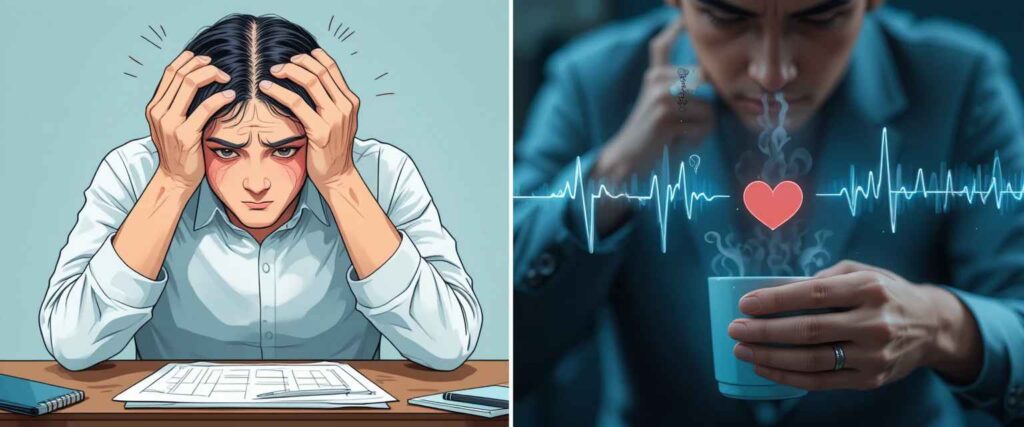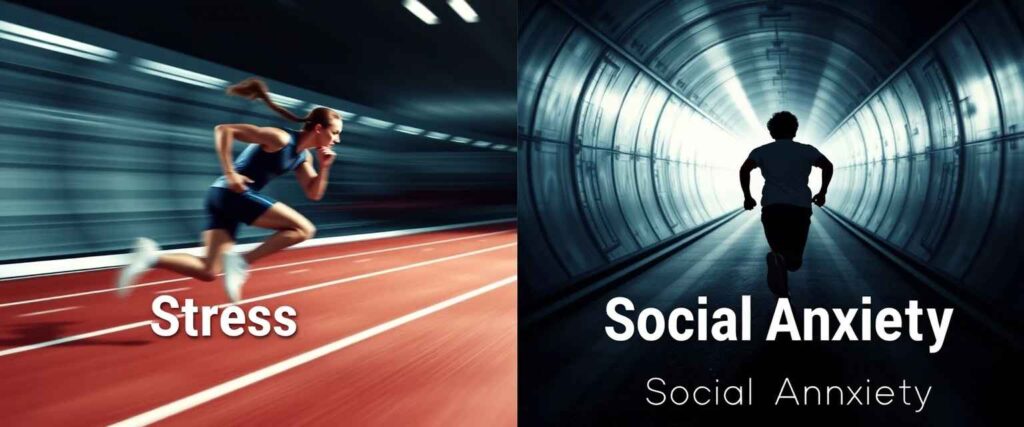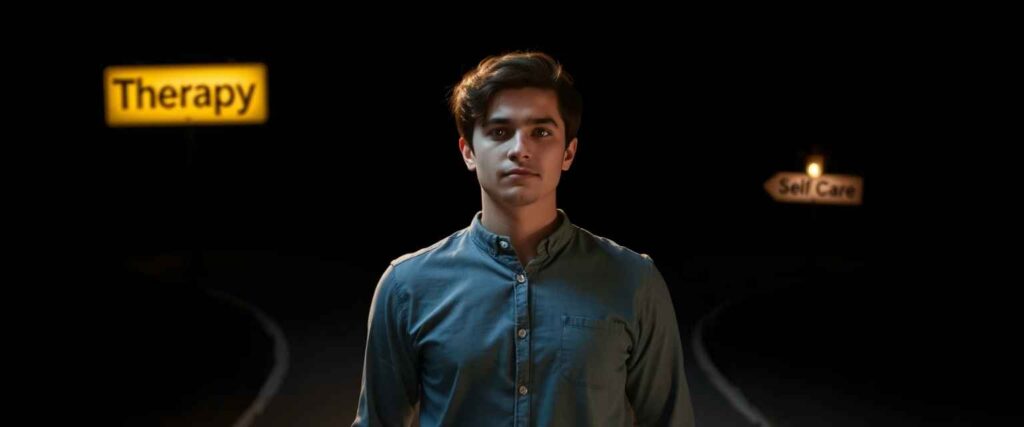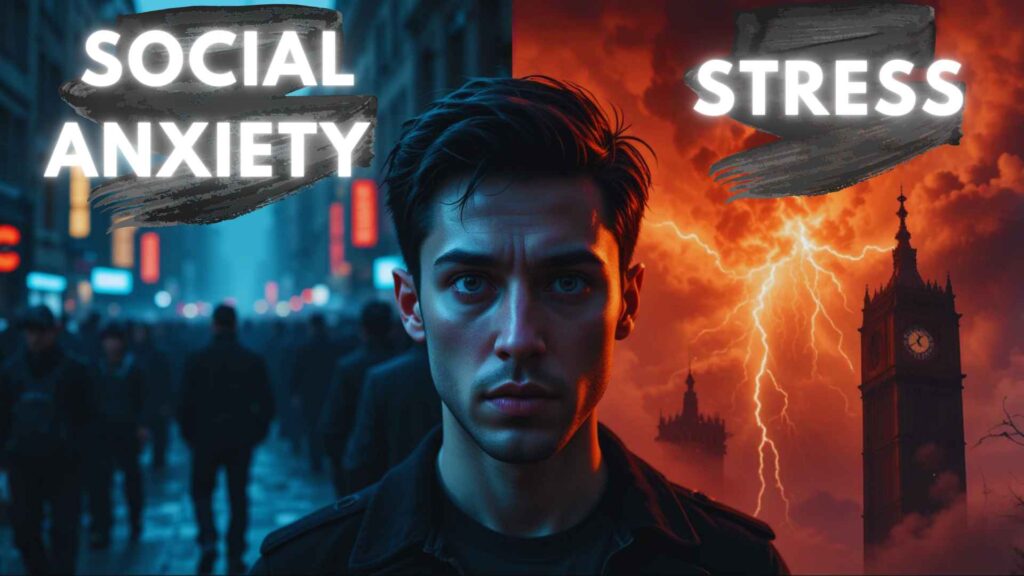We’ve all been there—your heart races, your palms sweat, and your brain feels like it’s stuck on a hamster wheel. But here’s the million-dollar question: Are you dealing with social anxiety, or is it just stress? These two might feel like twins at first glance, but mix them up, and you’ll end up using a Band-Aid for a broken bone. Let’s cut through the confusion and unpack the 7 major differences between social anxiety and stress in a way that’s honest, relatable, and free of therapist-office vibes. By the end, you’ll not only know what’s bugging you—but exactly how to kick it to the curb.
1. What’s Really Going On in Your Head? Social Anxiety vs. Stress
Stress is your brain’s fire alarm. Picture this: Your boss dumps a last-minute project on your desk, your kid’s school calls again, or your car decides to die mid-commute. Your brain screams, “EMERGENCY! FIX THIS NOW!” It’s urgent, loud, and temporary. Once the crisis passes, the alarm shuts off.
Social anxiety? That’s your brain’s overactive fanfiction writer. It spins wild stories like, “What if I sound stupid?” or “Everyone’s judging my weird laugh.” It’s not about a real problem—it’s a fear of people, not deadlines. Even a casual coffee chat can feel like walking a tightrope.
Why this matters:
- Stress says, “Do something!” (Like finally tackling that laundry mountain.)
- Social anxiety whispers, “Hide.” (Like ghosting your best friend’s birthday party.)
2. Triggers: What Flips the Switch? Stress vs. Social Anxiety

Stress triggers are the “adulting” nightmares we all groan about:
- Bills piling up like a Jenga tower.
- A screaming match with your partner over dishes (seriously, dishes).
- A work deadline that haunts your dreams.
These are clear, tangible problems. Fix the issue, and the stress fades.
Social anxiety triggers are sneakier. They’re not about what you’re doing—they’re about who’s watching:
- Walking into a party where you know no one.
- Posting a selfie (and then obsessing for hours about why no one liked it).
- Ordering takeout without stumbling over your words.
The fear isn’t the task—it’s the imaginary audience grading your every move.
Real-life example:
- Stress: Panicking over a work presentation but feeling relief once it’s done.
- Social Anxiety: Canceling a dinner date for weeks because you’re scared of awkward silences.
3. Your Body’s SOS Signals: Stress vs. Social Anxiety

Stress hits like a caffeine overdose:
- Heart racing? ✅
- Head pounding? ✅
- Stomach in knots? ✅
These are your body’s way of yelling, “DO SOMETHING!” Once the stressor’s gone, your body chills out.
Social anxiety plays dirty mind games:
- Your stomach flips days before a party.
- Your hands shake just thinking about a Zoom call.
- You sweat through your shirt during a casual chat with a neighbor.
Unlike stress, these reactions aren’t about a real threat—they’re fueled by imagined judgment.
Key difference:
- Stress = “Solve this problem!”
- Social Anxiety = “Escape these people!”
4.

Stress is that annoying houseguest who crashes on your couch for a weekend. Once the problem’s fixed (car repaired, fight resolved), they’re out the door.
Social anxiety is the roommate who never leaves. Even when life’s calm, you’re still dodging calls, avoiding group chats, or rehearsing conversations in your head. Over time, avoidance becomes a habit—and the anxiety grows louder.
Think of it like this:
- Stress is a sprint.
- Social anxiety is a marathon you never signed up for.
5. How They Wreck (or Maybe Help) Your Daily Life
Stress can sometimes be useful:
- It pushes you to finish a project.
- It helps you have that tough talk with your partner.
But too much? You’ll feel like a phone battery stuck at 1%.
Social anxiety doesn’t help—it steals:
- Skipping your cousin’s wedding because crowds terrify you.
- Staying silent in meetings, even with genius ideas.
- Avoiding dating apps because “What if they hate me?”
Left unchecked, it shrinks your world to the size of a closet.
Real talk:
- Stress makes you grumpy.
- Social anxiety makes you lonely.
6. Fixing It: What Actually Works for Stress vs. Social Anxiety
For Stress:
- Break it down: Tackle one tiny task (like washing one dish). Progress = hope.
- Move your body: Dance to Beyoncé in your PJs. It’s science—movement resets your brain.
- Talk it out: Call a friend, write a rage journal, or vent to your dog.
For Social Anxiety:
- Baby steps: Start with low-pressure interactions (like texting a friend “Hi!”).
- Flip the script: Ask, “What’s the worst that could happen? And would I survive it?” Spoiler: You would.
- Therapy: CBT (Cognitive Behavioral Therapy) helps rewire those “everyone hates me” thoughts.
Remember: Stress needs a deep breath. Social anxiety needs a toolkit—and maybe a pro to help you build it.
7. Why People Just Don’t Get Social Anxiety (But Totally Get Stress)

Stress is universal:
- “Ugh, work’s insane right now!” → Nods all around.
Social anxiety is invisible:
- Cancel plans? People think you’re flaky.
- Avoid eye contact? They assume you’re rude.
They’ll say things like, “Just relax! No one’s judging you!” (Spoiler: That’s like telling someone with a broken leg to “just walk it off.”)
What you wish they knew: It’s not about not caring—it’s about caring too much.
Read More:
- The Root Cause of Social Anxiety: Why Your Brain Thinks Everyone’s Judging You
- How to talk to people when you have social anxiety?
FAQs
1. “Can social anxiety and stress happen at the same time?”
Absolutely. Stress can crank up social anxiety’s volume. Think of it like bad Wi-Fi—everything buffers slower.
2. “How do I explain social anxiety to my family?”
Try: “Imagine every chat feels like a job interview. That’s my daily life.”
3. “Will yoga fix my social anxiety?”
It helps some! But if anxiety’s running the show, pair it with therapy.
- Is social anxiety a form of stress?
No. Stress is temporary; social anxiety is a chronic mental health condition. - Can social anxiety and stress happen together?
Yes. Stress can amplify social anxiety symptoms. - Natural ways to manage both?
Stress: Exercise, mindfulness. Social anxiety: Gradual exposure, therapy. - Difference between social anxiety and general anxiety?
Social anxiety = fear of judgment. General anxiety = constant, unspecific worry. - Same treatments for both?
Partial overlap (e.g., CBT), but social anxiety needs specialized strategies. - Why do I feel stressed in social situations?
Likely social anxiety if rooted in fear of judgment, not just situational pressure. - How long do they last?
Stress ends post-trigger. Social anxiety persists without treatment.
The Bottom Line: You’re Not Broken

Here’s the truth: Social anxiety and stress aren’t life sentences. They’re signals—your brain’s way of saying, “Hey, something’s off.”
- Stress = “I need to handle this problem.”
- Social Anxiety = “I need to protect myself from people.”
Both can be managed. Start small. Celebrate tiny wins (yes, sending that text counts). And if social anxiety’s got you in a chokehold? Asking for help isn’t weakness—it’s rebellion. Talk to a therapist, join a support group, or share this article with someone who just doesn’t get it.
You’ve survived 100% of your worst days so far. This one’s no different.

Pingback: Do I Have Social Anxiety? 5 Clear Signs to Help You Find Out | Anxieto